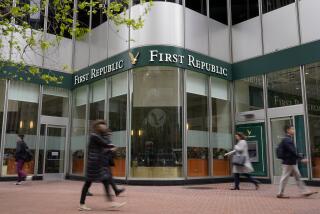Lessons From the Recovery
- Share via
NEW YORK — Each time news reached Edward Ho that another missing employee was found safe, he would open his spiral-bound notebook and cross off the name.
There was little else that Ho, a director and soon to be chief executive of IQ Financial Systems Inc., could do to help, stuck as he was on a business trip to Japan while the horror of Sept. 11, 2001, played out in New York.
Ho opened his battered tan notebook last week for the first time in nearly a year. There, in his cramped handwriting, amid phone numbers and to-do lists, were the four names he was never able to cross off: Melissa Doi, David Rathkey, Karen Schmidt and Courtney Walcott.
“It was very difficult,” Ho said. “In a company this size, everybody knows everybody.”
More than 2,800 people lost their lives in the World Trade Center assault. Beyond the human toll was a shock wave of economic devastation that hit New York City’s securities, tourism and commercial real estate industries with full force. Property damage and loss of revenue has been estimated as high as $80 billion.
The attack blew a $5-billion hole in the city budget, largely due to lost tax receipts. More than 80,000 jobs were lost, including an estimated 13,000 shifted to other locations, according the Fiscal Policy Institute.
Hundreds of businesses failed, but IQ Financial Systems, or IQFS, survived. Although the comeback trail has been painful, a year after the disaster, Ho and his colleagues say the company may be stronger than ever.
Among the lessons they have learned are that dislocated workers need to get back together quickly to recover their sense of shared purpose; no manager should be without an up-to-date list of employee phone numbers and e-mail addresses; customers need reassurance nearly as much and as soon as workers do; and, despite the outpouring of support that a crisis may bring, business is still business, and not everyone wishes you well.
IQFS makes software that helps banks and securities firms manage their commercial-loan portfolios. The private firm is about 70% owned by Deutsche Bank’s venture-capital arm and the rest by company management. At the time of the attack, IQFS was based on the 83rd floor of 2 World Trade Center, the second tower to be struck and the first to fall.
Many Avoided Attacks
Of about 110 IQFS employees who worked in the trade center, Ho estimated that no more than 40 reached the office that morning. That was not unusual. Some workers often began their day at client sites. Many also took advantage of flexible starting hours to cut commuting time.
Two people who did reach the office were sales manager Lisa Stone and software development chief Ken Katz, who told their stories in interviews last week. Like others who made their way down from the 83rd floor, they have harrowing memories of seeing the explosion and fire in the north tower and of escaping through crowded stairways while their own building shuddered from the impact of the second plane.
Katz walked north amid the dust and fluttering paper, finally catching a cab and persuading the driver to take him all the way home to Long Island.
On her way home to the Upper West Side of Manhattan, Stone stopped at a SoHo publishing house where a friend worked. She recalled people staring at her because, dressed in a sharp suit for a client meeting that afternoon, she somehow arrived “without a hair out of place.”
Ho, who had watched the attacks on CNN in his Tokyo hotel room, quickly began the frustrating task of trying to reach colleagues in New York by phone.
“About one in 20 calls was going through,” he said.
It was near midnight in Tokyo, and it would be the first of five straight sleepless nights for Ho. With international flights grounded, it would take him that long to get home.
Phone service was spotty in New York as well, but IQFS executives managed to contact one another that afternoon and evening.
They realized their first task was to determine who was missing. Nobody seemed to have a complete employee list, but everyone had at least a few names and numbers. By pooling their information, they cobbled together a phone and e-mail tree, assigning each manager a group of employees to contact.
It was important to be sensitive and not bombard anxious or grieving families with calls, Ho said, but it also was crucial not to rely on second-or third-hand information about people’s whereabouts.
“We wanted to know, ‘Did you personally talk to so-and-so?’ before we could say for sure they were safe,” he said.
Within two days, the list of missing employees in Ho’s notebook had shrunk to fewer than 20 and by the weekend, to four, the number that became final.
*
Need for Foresight
Even as they were arranging for grief counselors and dealing with stricken relatives, IQFS managers realized they needed to look ahead.
While making his rounds of phone calls, Katz discovered that after hearing about co-workers’ well-being, most people had the same question: “They were asking, ‘What’s next?’ Did they have a company to come back to?”
It was hardly an idle question. IQFS did not have a backup work site. Its only other U.S. location was in Williamsburg, Va. The hardware in that office would play a crucial role in restoring the company’s computer systems, but it was not an option as a headquarters.
Before thinking about a new workspace, Ho realized IQFS needed to quickly reassure its customers. The giant banks and brokerages that buy IQFS’ complex software packages also rely on the firm for ongoing support and consulting work.
On Sept. 13, Ho sent a two-page memo to customers, describing the recovery efforts.
“Despite the grief and the turmoil that [IQFS employees] are currently experiencing, they have, as a team, stepped in to restart the company’s operations very rapidly,” Ho wrote. “These individuals are the foundation of IQFS and the reason why you should feel confident that your company is in the best of care. We may be down, but we’re not out by any stretch.”
USC business professor Ian I. Mitroff, a crisis-management expert, applauded IQFS for quickly reaching out to customers.
“Vanguard organizations are always aware of their most important external stakeholders,” Mitroff said. “You need to send a signal to the marketplace saying, ‘We’re still in business.’ ”
IQFS’ source code, the DNA of its software products, had been backed up on tapes that were stored off-site. Using the backup tapes and the computers in Virginia, technicians were able to get things running again, but it took several weeks.
During those first few weeks, nearly all employees were working from home--that is, those who had work to do. Some of Katz’s crew who work directly with the source code could only wait.
“They wanted to contribute, not sit home,” he said.
*
Unifying Employees
Managers organized several phone-in conferences to give workers a chance to reestablish connections with the company and one another, and to blow off steam. There also was a well-attended barbecue in early October at an executive’s home.
Employees also gathered more somberly at memorial services for the four deceased co-workers.
Melissa C. Doi, 32, whom one customer recalled admiringly as “a take-charge woman,” was a passionate amateur ballet dancer. An understanding boss, she once helped a subordinate through a difficult pregnancy by letting her work from home some days.
David A.J. Rathkey, 47, the only married victim, left behind his wife and three young children. British born, he was a tea drinker and an avid outdoorsman. He passed his love of soccer on to his children, whom he coached in youth leagues.
Karen H. Schmidt, 42, who “never missed a deadline” in her work with the company’s risk-management software, was renowned as a baker of cookies. She often organized bridal and baby showers and constantly bragged about her nieces.
Courtney W. Walcott, 37, a golf enthusiast and a New York Jets fan, was a star defensive back on the Hofstra University football squad. Devoutly religious, he worked through his church as a mentor to teenage boys.
In some ways, those early weeks were easier for the sales and customer-support staffs because they could continue calling on clients, who showered them with sympathy and encouragement, according to Stone, the sales manager.
IQFS also began hearing from customers that it was getting bad-mouthed by a competitor, Ho said.
“They went out and told our clients we were history,” he said. “I won’t ever forget that.”
As it happened, the tactic may have backfired. IQFS employees used the incident as a rallying point.
About the same time, in late September, the company scored a huge emotional victory by signing a $7-million contract with Merrill Lynch.
The giant brokerage chose IQFS as its vendor after an exhaustive, five-month selection process and scheduled a contract signing for Sept. 11, according to Paul Fox, the Merrill executive in charge of the selection.
“The only business decision I had was to make sure the source code could be reconstructed,” Fox said last week. “Was there an element of trust? Yes, but they had earned it. There was no aspect of charity in the decision.”
Still, the signing was a strong expression of Merrill’s faith that the battered company could deliver on the contract, and it was a big boost to morale, according to Stone.
She recalled the kick-off meeting, at which IQFS staffers met their counterparts at Merrill Lynch, as especially festive.
As October approached, IQFS employees were impatient to get back to work in a permanent space. It seemed to many that the relocation was taking forever, Ho said.
*
Finding a New Location
Finding new space was not easy, especially because employees had expressed very strong criteria for new headquarters, according to Ho.
The new office could not be in a prominent landmark building, nor anywhere near ground zero. It had to be a low-rise with exceptionally good fire-safety characteristics. For budgetary reasons, Ho added another condition: It could not be north of 30th Street, where rent is exorbitant.
Ho hired six commercial brokers and personally looked at 26 potential locations. He passed up a “beautiful” space being vacated by a much larger technology firm because it was right on top of Madison Square Garden--too high-profile for his employees.
The company finally settled on a fifth-floor office in a nondescript brownstone building on 23rd Street. Ho visited the 22,000-square-foot space five or six times with various groups of employees to satisfy their concerns.
In late October, IQFS moved into its new headquarters, taking over computer equipment that Ho said he purchased for “25 cents on the dollar” from the previous tenant, a struggling dot-com company.
During the first 10 months in its new space, IQFS experienced a few layoffs and some strategic restructuring that involved selling off some product lines.
In a management change that was in the works before Sept. 11, Ho was installed as chief executive in September.
Despite a tough economy, the company’s sales probably will be flat with last year’s $35 million, and it will maintain the profitability that it achieved for the first time in 2001, Ho said.
Fox, of Merrill Lynch, said he admires the company’s determination.
“Those people had to find ways to be better because they didn’t have all the old tools they used to rely on,” he said. “I would definitely say they are stronger for it.”






